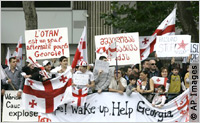PEACE & SECURITY | Creating a more stable world
11 August 2008
Russian Attack on Georgia Unacceptable, Says Bush
White House urges immediate cease-fire as envoys arrive in the region

Washington -- Russia’s continued attacks despite a proposed Georgian cease-fire mark a “dramatic and brutal escalation” in the crisis over the breakaway region of South Ossetia, says President Bush.
“Russia has invaded a sovereign neighboring state and threatens a democratic government elected by its people. Such an action is unacceptable in the 21st century,” Bush said in the White House Rose Garden August 11.
Bush returned earlier in the day from the 2008 Olympic Games in Beijing, where he met with Russian Prime Minister Vladimir Putin during the athletic events to discuss the ongoing crisis. “I expressed my grave concern about the disproportionate response of Russia and that we strongly condemn bombing outside of South Ossetia,” he told NBC Television in an August 11 interview.
Bush followed up with calls to both Russian President Dmitry Medvedev and Georgian President Mikheil Saakashvili, urging a halt to the violence, withdrawal of Russian combat forces and return by all parties to pre-conflict boundaries before entering into peace talks. (See “United States Seeks Emergency Mediation to Defuse Georgia Crisis.”)
“The Russian government must reverse the course it appears to be on and accept this peace agreement as a first step toward resolving this conflict,” Bush said.
Despite the Georgian cease-fire proposal and Georgia’s withdrawal of troops from the South Ossetia conflict zone, Russian warplanes pushed outside the Moscow-backed separatist region, targeting the nearby city of Gori and the Black Sea port of Poti, as well as a civilian airport outside Georgia’s capital, Tbilisi. Meanwhile, news reports of Russia opening a second front with airstrikes, troop buildups and seizures of bases to the west in Georgia’s disputed Abkhazia region threaten to further widen the conflict, says a top White House adviser.
“Right now, our focus is on trying to end the fighting, to get people back in place and to get a diplomatic process under way,” Deputy National Security Advisor Jim Jeffrey said August 10.

Secretary of State Condoleezza Rice reiterated Bush’s message to Russian Foreign Minister Sergei Lavrov in several phone conversations in recent days –- as well as an August 11 conference call with Russia’s fellow G8 members Britain, Canada, France, Germany, Italy and Japan to urge the Kremlin to respect Georgia’s borders and to express concern about civilian casualties.
“Russia’s actions in this week have raised serious questions about its intentions in Georgia and the region. These actions have substantially damaged Russia’s standing in the world and these actions jeopardize Russia’s relations with the United States and Europe,” Bush said.
Deputy Secretary of State John Negroponte also pressed Washington’s case with senior Russian Embassy officials, while Admiral Mike Mullen, the chairman of the Joint Chiefs of Staff, reached out to Russian military leaders.
At the U.N. Security Council, members debated a draft resolution condemning the violence and raising questions among some representatives on whether Russia’s ultimate aim is the removal of Georgia’s reformist president, Saakashvili, whose efforts since the 2003 Rose Revolution to put his country on a path to join NATO and other international institutions have drawn angry criticism from the Kremlin. (See “Rice Urges End to Separatist Violence in Georgia.”)
Media reports suggest that as many as 2,000 people have been killed in the fighting and up to 30,000 have been displaced, but these estimates cannot be independently verified.
The crisis topped the agenda during Bush’s meeting with Chinese President Hu Jintao, as well as a later meeting with French President Nicolas Sarkozy, who currently holds the European Union’s rotating presidency. European leaders joined the United States in expressing their concern as French Foreign Minister Bernard Kouchner and Finnish Foreign Minister Alexander Stubb, representing the Organization for Security and Cooperation in Europe (OSCE), arrived in Tbilisi to launch the international mediation effort. Special envoy Matt Bryza, U.S. deputy assistant secretary of state for European and Eurasian affairs, also will take part in the peace talks.
“We have sent an envoy to the region and we will continue to work in the U.N. with the OSCE, which has a mission in South Ossetia, and with the international community, to bring this extremely dangerous situation to an end,” Jeffrey said.
Kouchner told reporters in Tbilisi that Saakashvili has agreed to the envoys’ peace proposal, which they will take to Moscow August 12.
“We have made it clear to the Russians that if the disproportionate and dangerous escalation on the Russian side continues, that this will have a significant long-term impact on U.S.-Russian relations,” Jeffrey said.
See the transcript of Bush’s Rose Garden remarks.
